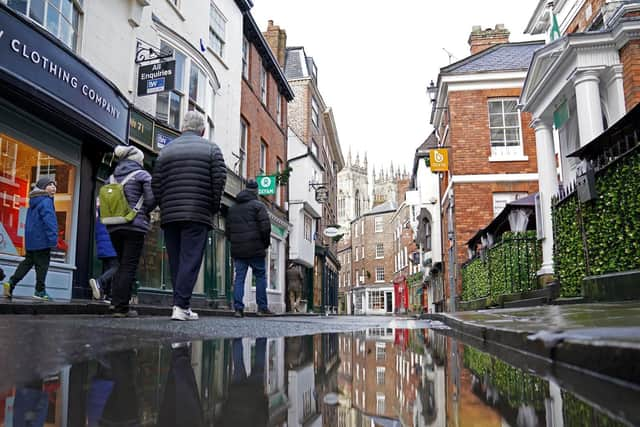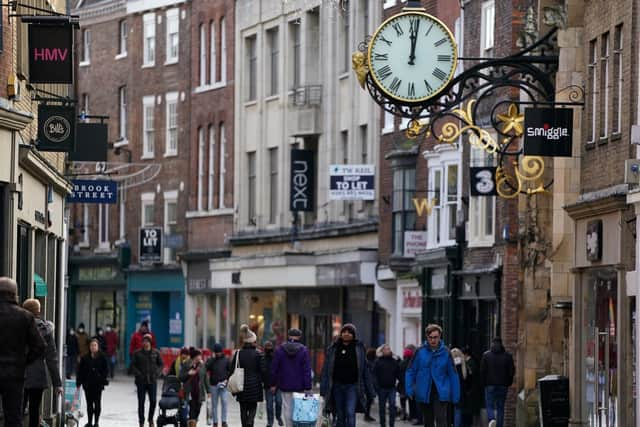Risk of 'losing soul' of York if empty shops are turned into flats, says councillor
Andrew Waller of City of York Council described the new laws - which allow developers to turn shops, post offices and pharmacies into apartments without needing planning permission - as a “bit of a blunt instrument”.
And the Liberal Democrat councillor’s concerns were echoed by heritage charity the National Trust, which said it was “disappointed” the new permitted development rights (PDR) rules would apply in protected ‘conservation areas’ which include the centre of York, with its medieval alleys.


Advertisement
Hide AdAdvertisement
Hide AdAs part of the Government’s reforms, full planning applications will no longer be required to convert unused retail premises for residential use. Restrictions will also be relaxed so that empty shops can be turned into cafes or restaurants more easily.
Housing Secretary Robert Jenrick said that converting unused commercial buildings into homes will encourage more people to live near high streets and use the areas for both work and leisure.
He said: “By diversifying our town and city centres and encouraging the conversion of unused shops into cafes, restaurants or even new homes, we can help the high street to adapt and thrive for the future.”
City of York Council stressed the need for “special consideration” of conservation areas within the city amid warnings that reforms to the way developments are approved should "not be at the expense of public involvement" and must still allow councillors to represent the views of communities.


Advertisement
Hide AdAdvertisement
Hide AdAndrew Waller, the authority’s Executive Member for Economy and Strategic Planning, highlighted the council purchase of the historic York street The Shambles in the 1920s to stop them being redeveloped.
He told The Yorkshire Post: “Cities like York benefit from having had strong planning control in the past - which has prevented some of the changes that had been planned from taking place.
“There needs to be the space for considered and sensitive regeneration but not a free for all that could result in some changes to buildings that don’t help in the long run.
“The last 12 months has just really sped up the change on the high street… there had to be special consideration of conservation - particularly the historic core of the city.


Advertisement
Hide AdAdvertisement
Hide Ad“If there is a universal conversion of one set of property use to another then that would threaten the viability of the city centre.”
Ingrid Samuel, heritage director at the National Trust told The Yorkshire Post the organisation was “disappointed to see these changes”.
She said councils will be “practically powerless” to prevent business premises being turned into poor quality housing that damages local character and is in unsustainable locations.
She added: “We’re particularly disappointed that these changes will also apply in Conservation Areas, where extra care should be taken to safeguard local history and beauty.”
Advertisement
Hide AdAdvertisement
Hide AdIn York, Coun Waller said “sensitive regeneration” which recognises the heritage of the city would be a “welcome” positive, but warned there was a risk of “out of town developers” trying to maximise profits due to the planning changes.
“It is about recognising there are ways of working which will enhance the historic core of the city but potentially there are risks that there is an out of town developer who is just trying to maximise their investment and not that bothered about the impact it will have on the people who live there.”
He added it would be “vital” to retain localised powers that can enable what goes on at the ground floor level of empty shops to aid future footfall in the city.
Coun Waller said: “The danger is this is a catch-all policy from government that doesn’t enable specific areas to be retained as a post covid city centre with a wide range of activities to maintain footfall.
Advertisement
Hide AdAdvertisement
Hide Ad“If an entire building switched from being retail use to solely residential then you would lose the ground floor retail opportunities… that would threaten the viability of the city centre.
“It’s a bit of a blunt instrument.”
He added: “Yes we do want regeneration and use of upper floors - that is something that many people have been calling for, for a number of years.
“The fundamental principle is that it should still be under democratic control for oversight.”
Thousands of shops have shut during the past 12 months as the pandemic accelerated changes already being forced on the High Street by the rise of online shopping.
Advertisement
Hide AdAdvertisement
Hide AdThe Government aims to build 300,000 homes a year by the middle of the decade - part of a plan to help high streets “adapt and thrive”.
A spokesperson for the Ministry of Housing, Communities and Local Government said: “We are overhauling the outdated planning system to give communities more control from the start of the planning process. These changes to permitted development rights will help support our high streets by removing eyesores and transforming unused buildings into much-needed new homes.
“Measures are in place to protect existing recreational green spaces and important community assets, as well as to ensure all developers deliver high-quality, sustainable homes that meet national building regulations.”
__________
Support The Yorkshire Post and become a subscriber today.
Your subscription will help us to continue to bring quality news to the people of Yorkshire. In return, you'll see fewer ads on site, get free access to our app and receive exclusive members-only offers. Click here to subscribe.
Comment Guidelines
National World encourages reader discussion on our stories. User feedback, insights and back-and-forth exchanges add a rich layer of context to reporting. Please review our Community Guidelines before commenting.